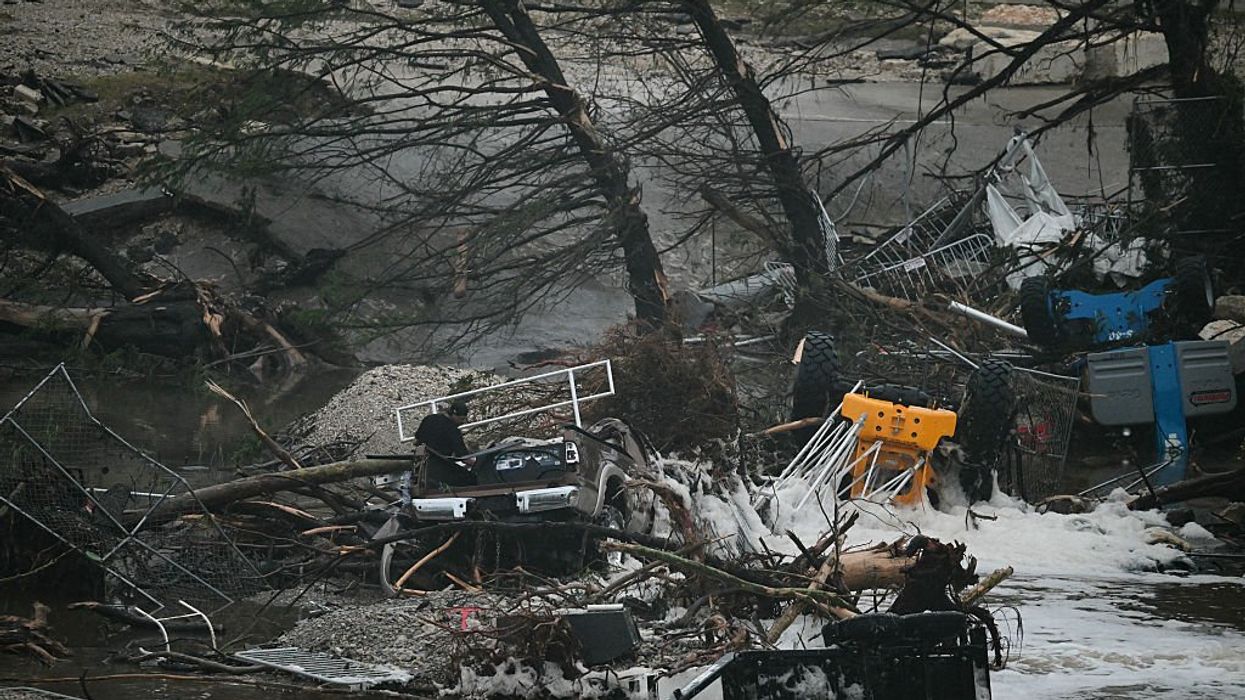
© 2025 Blaze Media LLC. All rights reserved.
Lunacy?' U.S. Agrees to Enter Into Treaty to Begin Cutting Emissions by 2020
December 12, 2011
"International agreements are simply a means to stimulating technological innovation."
A deal of sorts was reached during the hard-fought global climate conference in South Africa over the weekend. Emission targets will be established for countries by 2015 but won't be enforced until 2020, which some say is too late while others call out "lunacy" within the deal.
This is the first time the U.S., along with India and China, have agreed to enter into such a treaty, which is being called a "protocol, legal instrument or an agreed outcome with legal force".
"We avoided a train wreck and we got some useful incremental decisions," said Alden Meyer, of the Washington-based Union of Concerned Scientists. "The bad news is that we did very little here to affect the emissions curve which is accelerating, and the impacts of climate change which are climbing day by day."
Even with delayed required emission reduction efforts, The Telegraph reports Chris Huhne, the Energy and Climate Change Secretary, as saying that he believe the deal will still encourage reductions sooner:
"What we have done today is a great success for European diplomacy. We have managed to put this on the map and take the major emitters – the US, India and China – to a road map that will secure an overarching deal," he said.
Watch the BBC News report of the deal:
Lord Christopher Monckton, who was at first banned from the conference and then parachuted down into the city, wrote that the deal is "off the wall" and "lunatic" citing some of the following aspects:
- A new International Climate Court will have the power to compel Western nations to pay ever-larger sums to third-world countries in the name of making reparation for supposed “climate debt”. The Court will have no power over third-world countries. Here and throughout the draft, the West is the sole target. “The process” is now irredeemably anti-Western.
- “Rights of Mother Earth”: The draft, which seems to have been written by feeble-minded green activists and environmental extremists, talks of “The recognition and defence of the rights of Mother Earth to ensure harmony between humanity and nature”. Also, “there will be no commodification (whatever that may be: it is not in the dictionary and does not deserve to be_ of the functions of nature, therefore no carbon market will be developed with that purpose”.
- “Right to survive”: The draft childishly asserts that “The rights of some Parties to survive are threatened by the adverse impacts of climate change, including sea level rise.” At 2 inches per century, according to eight years' data from the Envisat satellite? Oh, come off it! The Jason 2 satellite, the new kid on the block, shows that sea-level has actually dropped over the past three years.
Still, many scientists maintain that as greenhouse gases continue to rise, the world's climate will reach a tipping point with irreversible effects, such as melting ice sheets and rising sea levels. They cannot pinpoint exactly when that would happen, but the two-decade-long climate negotiations have been focused on preventing global temperatures from rising more than 2 degrees Fahrenheit (1.2 degrees Celsius) above current levels by the end of this century.
A report released before the Durban talks by the U.N. Environment Programme said greenhouse gas emissions need to peak before 2020 for the world to have a shot of reaching that target. It said that's doable only if nations raise their emissions pledges. In Durban, they did not.
Sunday's deal extends by five years the Kyoto Protocol, the 1997 agreement that has binding emissions targets for some industrial countries but not the world's biggest carbon polluters, China and the United States.
The Durban agreement also envisions a new accord with binding targets for all countries to take effect in 2020. And it sets up the bodies that will collect, govern and distribute tens of billions of dollars to poor countries suffering the effects of climate change.
The U.S. doesn't want to commit to any binding deal unless it also imposes strict emissions targets on China and India. The latter insist their targets should be more lenient because, historically, the West has a bigger share of the blame for man-made warming.
Some say the diplomatic effort to solve the climate issue has already failed, and that the answer lies in the development of green technologies outside the U.N. process.
"Handing the problem to diplomats was one of the first failures," Dan Sarewitz, professor of science policy at Arizona State University, said in an email.
The idea that the global energy system could be decarbonized by anything other technological developments, driven to a large extent by national polices and businesses, "was never more than a delusion," Sarewitz said.
Roger Pielke Jr. of the University of Colorado said treaties and timetables don't reduce emissions.
" Technology reduces emissions," he said. "International agreements are simply a means to stimulating technological innovation. In the climate debate we have confused ends and means."
Even in Durban, there was a growing recognition that the transition to a low-carbon economy must be underpinned by a revolution in new energy, said Nicholas Stern, who wrote a landmark 700-page report in 2006 on the effect of climate change on the global economy.
U.N. officials hailed the Durban conference as a success, and judged against the low expectations for climate talks following the breakdown of the much-hyped Copenhagen talks two years ago, that's not unreasonable.
"I salute the countries who made this agreement. They have all laid aside some cherished objectives of their own to meet a common purpose — a long-term solution to climate change," said U.N. climate chief Christiana Figueres.
The process now lives on, but the difficult part lies ahead: raising the targets for emissions cuts enough to slow the rise in temperatures. Right now, there are few signs suggesting that's going to happen.
That means efforts to reduce emissions through national and local regulations, and in the private sector through new technologies, "need to accelerate to full throttle," said Michael Oppenheimer, professor of geosciences and international affairs at Princeton University.
"If all countries pushed renewable energy and other low-carbon technologies with corresponding vigor while (simultaneously) pulling the various regulatory levers available to them," Oppenheimer said, "we might have a chance to beat the benchmark of danger.
The Associated Press contributed to this report.
Want to leave a tip?
We answer to you. Help keep our content free of advertisers and big tech censorship by leaving a tip today.
Want to join the conversation?
Already a subscriber?
more stories
Sign up for the Blaze newsletter
By signing up, you agree to our Privacy Policy and Terms of Use, and agree to receive content that may sometimes include advertisements. You may opt out at any time.
Related Content
© 2025 Blaze Media LLC. All rights reserved.
Get the stories that matter most delivered directly to your inbox.
By signing up, you agree to our Privacy Policy and Terms of Use, and agree to receive content that may sometimes include advertisements. You may opt out at any time.






